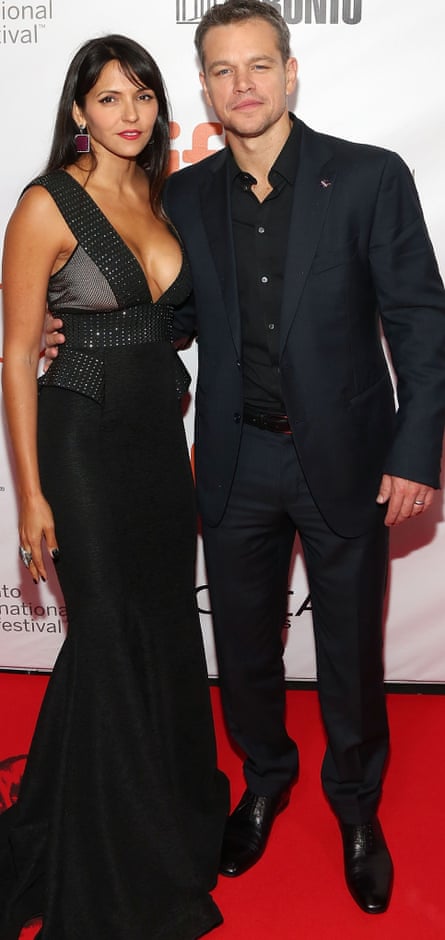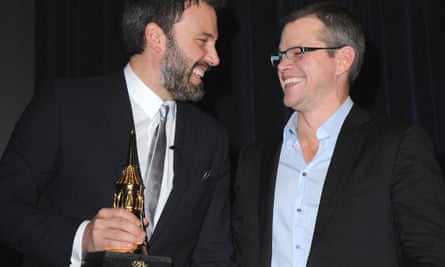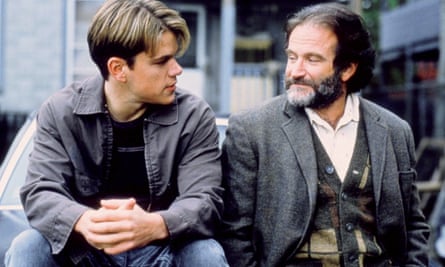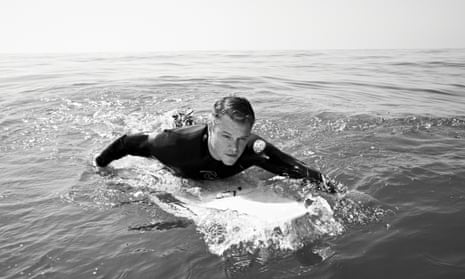I am sitting opposite Matt Damon and he is saying he’s sorry for being a bad movie star. He can’t help it, he says. He’s simply too dull.
“I think people just leave a room I’m in and they’re like: Well that guy wasn’t a movie star,” he explains. “Jesus! Anybody could do that.”
We are sitting in a gloomy hotel room, at a large round conference table which is too big for the two of us. Damon is dressed like a father on the school run: sensible navy blue polo shirt, trousers with practical pockets down the side. He has a smattering of facial hair. The most film-starry thing about him is his muscle tone: he has arms that look like they’ve been drawn by a Popeye animator.
Other than this, Damon insists he’s entirely normal. He has a wife, Luciana, whom he met while filming in Miami in 2003 when she was working behind a bar, and the couple have four daughters ranging in age from four to 16 – Alexia, from Luciana’s previous relationship, Isabella, Gia and Stella. Damon is a self-confessed family man. He has a rule that they will never be apart for more than two weeks while he’s filming. His daily life is so average even the paparazzi have decamped from outside his home in Los Angeles because he never does anything that merits a photograph.
“You know, a guy who’s married happily with four kids is not quite a story,” Damon says with a sorry-but-what-can-you-do smile. “And so they’ll come back and they’ll take an occasional picture… but it’s kind of just updating the file.”
I’m not entirely buying this. At 44, Damon is smart enough to know that his supposed “normality” is his stock in trade. His approachability on-screen, combined with a sense of nuance and depth, has lent his performances a likeable, everyman-ish quality that has proved to be box-office catnip.
In 2007, Forbes magazine named Damon as Hollywood’s most bankable actor, averaging $29 in takings for every dollar he earned in a movie. From Good Will Hunting (which Damon co-wrote with Ben Affleck, winning the 1997 Oscar for best screenplay) and Saving Private Ryan to the big-budget Bourne movie franchise or the dystopian sci-fi fantasy Elysium, he has a capacity to hint at a character’s inner complexity without ever veering into pretension. According to Manohla Dargis of the New York Times, Damon’s power lies in his ability “to recede into a film while also being fully present”.
His latest project is no exception. In The Martian, directed by Ridley Scott and co-starring Jeff Daniels, Chiwetel Ejiofor and Kristen Wiig, Damon plays Mark Watney, a Nasa astronaut who finds himself stranded on Mars after he is injured in a fierce storm and presumed dead by his crew.
Admittedly, an astronaut is hardly your average kind of Joe, but Damon manages to imbue the role with his classic down-to-earth sensibility. When Watney is confronted with a problem, he solves it through the power of science and logical thinking. Despite forever teetering on the verge of an existential crisis, Watney remains quick-witted and optimistic. When he runs out of food, he simply starts growing potatoes in his own vacuum-packed faecal matter. That kind of thing.
I wonder if filming The Martian made Damon contemplate his own resourcefulness. Would he be good in a similar situation?
“Probably not, no. I have too many connections that matter to me. It might be fun for a day, you know, but no. I’d probably go a little bonkers.”
Even as a small boy, he never wanted to be an astronaut, preferring instead the world of superheroes. When he was growing up in Cambridge, Massachusetts, with his older brother Kyle, his mother would put out a dressing-up box and he would choose either a red or blue floral towel, safety-pinning it round his neck like a cape. The red towel was for Superman. Blue was for Shazam, the teenage hero of a 70s TV series who could transform into Captain Marvel.

“That was how I broke my ankle,” Damon recalls. “When I was three, I climbed to the top of the jungle gym in my Shazam cape and I shouted ‘Shazam!’ And I tried to fly and I fell.”
He remembers his stockbroker father, Kent, running across from the other side of the playground to come to his aid and what stuck in Damon’s mind was not the pain in his ankle but the way his father was running – like an athlete, with pumping arms and a long, fluid pace.
“I remember afterwards, when I healed, months later, trying to jog [like him]. So I would jog pumping my fists to the ground. I was trying to ape the movement, but I wasn’t quite pulling it off.” He shakes his head, laughs.
He was three, he’d just broken his ankle, but Damon’s focus was already on how another person was behaving and how he could best mimic it.
His parents later divorced and the boys lived with their mother, Nancy Carlsson-Paige, a university professor specialising in early education. Apparently, she always knew he was going to be an actor because of his love of costume and role-playing, and his ability to entertain himself for long stretches of time.
But Damon found fame as one-half of a long-term collaboration. Ben Affleck was his childhood best friend – the two of them met when they were eight and attended the same high school. Damon went to Harvard, Affleck to the University of Vermont, but both dropped out before getting their degrees and worked together on the script for Good Will Hunting, which drew on their own experiences growing up in Cambridge. The script was bought by Castle Rock in 1994. Three years later it became a huge critical and commercial success starring Damon as undiscovered genius Will Hunting, with Affleck as his childhood friend, and Robin Williams as the psychologist who helps Hunting come to terms with his talent.
“I laughed the entire time we wrote,” Damon says now. “It was a really joyful experience.” He was less enamoured of his sudden celebrity. “You wake up one morning and the world is entirely the same and you know, actually, all the things that mattered yesterday are the same today, except the world is forever going to be a totally different place for you,” he says.
“That’s the mind-fuck and it takes a few years to even get your head around what’s happening… I remember my brother said: ‘How are you doing?’ And I was, like, ‘I’m the fucking same, but everyone else is different.’”

He credits his “really solid childhood” with getting him through. But for people who lack a support network, or whose fame reaches absurdly overblown levels, it is a different story. We are meeting almost exactly a year after his Good Will Hunting co-star, Robin Williams, took his own life. Williams suffered from severe depression. I ask Damon if he worries about the pressures fame can put on an individual’s mental health.
“Of course,” he says quietly. “Peter Farrelly, who is a friend of mine, the director, he was talking about suicide and he said something really lovely, which was: ‘Whenever that happens to a friend of mine [suicide], I feel like they’re just in a house on fire and they have to get out.’ I hoped that it [Williams’s death] could lead to a wider discussion about mental health because if somebody that incredible and wonderful – just such a light – could be living with that, hopefully it could give other people permission to talk about this to people around them. So that at least something positive came out of something so horrible.”
It’s nice, talking to Damon. Unlike many actors, he answers questions with a reflective openness. There is a feeling that nothing is out of bounds. He is politically engaged – a Democrat, but also a critic of Barack Obama (he has spoken out about Obama’s education policies and questioned the legality of drone strikes) and says he’s deeply worried about the chasm between rich and poor in America in the aftermath of the economic crisis.
“That anger did not go away because none of these guys [the bankers] got prosecuted and they all have our money, and these houses in the Hamptons they live in – that they claim to have earned – are paid for with our money. I mean, that’s what happened! And so, I don’t know what the consequences for that kind of thing are.”
He maintains a steady eye contact and has a dry sense of humour. When I ask, in the middle of a discussion about directors, whether he would ever consider being directed by Affleck, he replies deadpan: “Sure, if the right thing came along.” Pause. “I mean, he usually gives himself the main role in the thing he’s directing, so it would need to probably be a two-hander.”
He says that when picking projects, he is entirely guided by the quality of the director: “That’s all that matters in film. The rest of it is utter bullshit. A mediocre director will ruin a great piece of material.” Has he worked with mediocre directors in the past? “Yes.”
He won’t name names. But for every big-budget blockbuster he has been attached to, Damon has put in a quieter, more complex performance in films like Anthony Minghella’s The Talented Mr Ripley or The Good Shepherd, directed by Robert de Niro, or Martin Scorsese’s The Departed. In 2013, he starred as Liberace’s lover, Scott Thorson, in the Steven Soderbergh television drama film Behind the Candelabra.

Damon was a straight man playing gay. Is it harder for actors to be openly gay in Hollywood? “I’m sure. When Ben and I first came on the scene there were rumours that we were gay because it was two guys who wrote a script together.”
Really?
“I know. It’s just like any piece of gossip… and it put us in a weird position of having to answer, you know what I mean? Which was then really deeply offensive. I don’t want to, like [imply] it’s some sort of disease – then it’s like I’m throwing my friends under the bus. But at the time, I remember thinking and saying, Rupert Everett was openly gay and this guy – more handsome than anybody, a classically trained actor – it’s tough to make the argument that he didn’t take a hit for being out.”
He thinks attitudes are changing, and welcomes the introduction of same-sex marriage in California in 2008. “I think it must be really hard for actors to be out publicly,” he continues. “But in terms of actors, I think you’re a better actor the less people know about you period. And sexuality is a huge part of that. Whether you’re straight or gay, people shouldn’t know anything about your sexuality because that’s one of the mysteries that you should be able to play.”
So is Matt Damon just a normal guy, adept at pretending to be mysterious? I don’t think so. He’s cleverer than that: he’s worked out that the appearance of averageness affords the greatest opportunity for privacy and creative space.
How would he describe himself as an actor? There is a long pause. “I don’t know,” he says. “Subtle, hopefully.”
The arms though. The arms give him away.
The Martian is out in the UK on 30 September

Comments (…)
Sign in or create your Guardian account to join the discussion